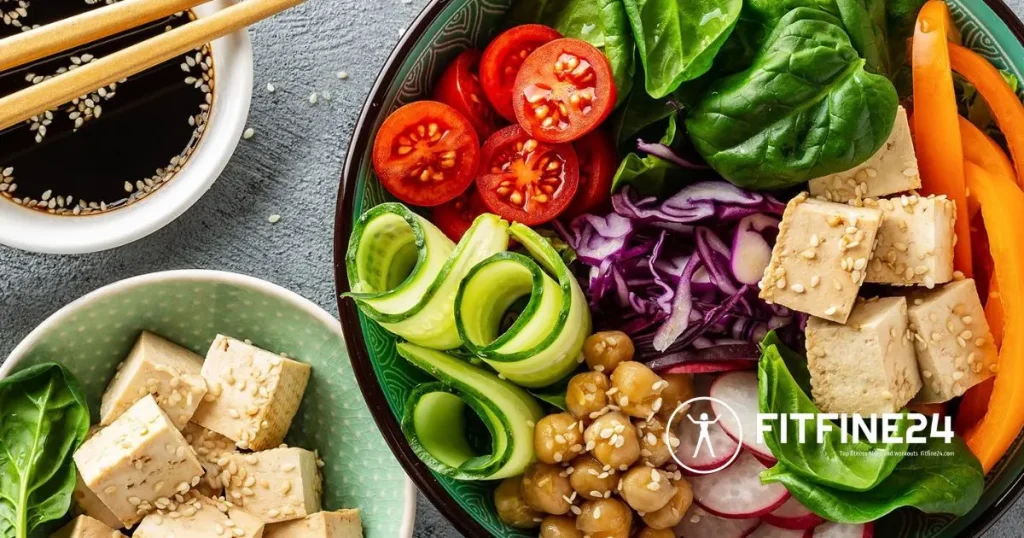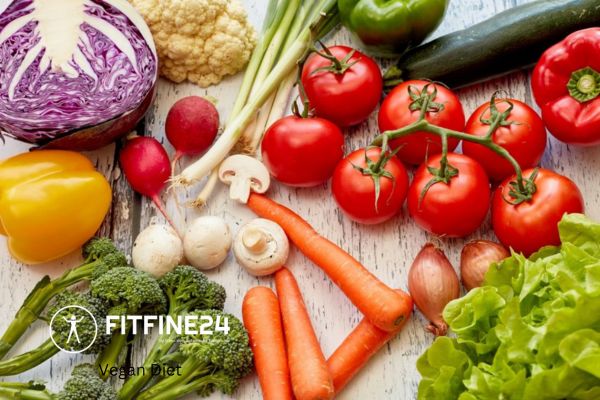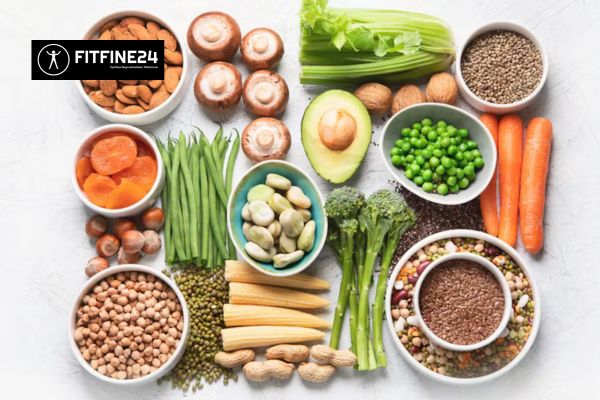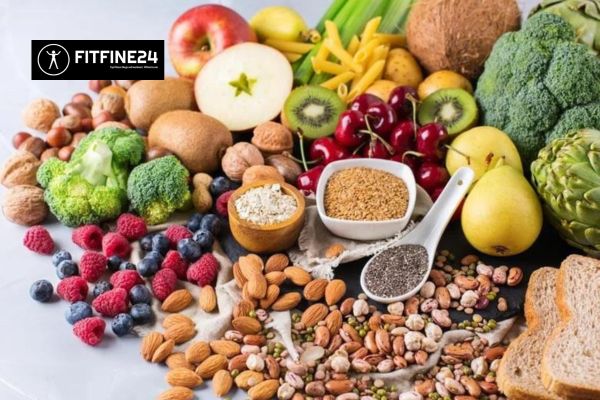
Once considered a fringe food habit, veganism is becoming more and more mainstream as bodybuilders, athletes, and health nuts of all stripes embrace 100% plant-based eating. A plant-based diet is not just another fad diet, rather it is more of a lifestyle defined simply as one that focuses on fortified food sources by omitting any animal-based foods. When done correctly, with the proper planning and a little understanding of what our body needs to fuel workouts, support muscle recovery, and long-term health benefits — such as the Optimum Nutritions NSNS approach- Vegan Diets can provide all of these nutrients.
Today, we are diving deeper into the health benefits of living a vegan lifestyle in terms of fitness, what it takes to meet your protein and essential nutrient needs as well as some tips along with recipes on how to incorporate that plant-based fear factor to your gain train.
What is a Vegan Diet?
There is one exception here — a vegan diet means all plant-based, and it excludes all forms of animal products such as Meat, Dairy, Eggs, or Honey. This form is centered around whole foods such as fruits, vegetables, legumes, grains, nuts, and seeds with a wide range of associated health benefits. Now, with plant-based alternatives on the rise you can include mock meats, dairy-free cheese, and plant protein powders which take care of that issue.
3 Nutritional Properties of a Vegan Diet
As long as it is planned correctly, following a vegan diet can provide all the necessary nutrients including:
Fiber —available in fruits, vegetables, whole grains, and legumes, high-fiber foods support healthy digestion along with weight control and reduced risk for chronic disease.
A plant-based diet is also high in vitamins A, C, and E as well as minerals like potassium, magnesium, and folate—all of which are important for your health.
Monounsaturated & Polyunsaturated Fats – Vegan diets provide monounsaturated fats from foods like nuts, seeds, and plant oils (e.g. olive oil): good for brain health and hormone functioning.
Phytonutrients and Antioxidants — These types of plant compounds help the body fight off oxidative stress, decrease inflammation, and reduce chronic disease.
While eating a vegan diet can provide many health benefits and give you an advantage in your fitness performance, there are some nutrients that you must take special care to get enough of, such as vitamin B12, iron, calcium, omega-3 fatty acids namely EPA + DHA (eicosapentaenoic acid and docosahexaenoic acid) from algae oil or vegan fish oil) and protein.

Vegan Diet for Training & Performance
Improved Recovery and Less Inflammation One of the biggest pros of a vegan diet is that you consume large amounts of these antioxidants, which can help reduce inflammation. Muscle inflammation can obstruct recovery after heavy workouts. Since there are plenty of fruits, vegetables, and whole grains as in the case of a vegan diet, you will receive the antioxidants vitamins C and E which decrease oxidative stress leading to quicker recovery and less downtime between workouts.
Better Digestion and Weight Control A vegan diet that is high in fiber could mean healthy digestion and bowel management. Better digestion helps the nutrients present in the food to get absorbed very well which is an essential point for all your fitness performance. Fiber also promotes fullness and satiety after eating, reducing excess energy intake in the form of food to help keep you at a healthy weight. High body fat percentages often translate to lowered endurance and sometimes mobility during workouts, causing a lot of ppl switching into veganism experience improved endurance.
Increased energy levels Plant-based dietsare loaded with complex carbohydrates, which help to sustain your energy requirements during your workouts. Whole grains, not only provide you with the long-lasting energy that will help to fuel your performance but they are more unlikely to leave you in a half-disabled bloated experience energy crash state that would have come follow a high-fat or packaged food diet.
Running and vegan diet advantages Low saturated fat and cholesterol also means your heart could be healthier running easier. Cardio Training Is Important For Athletes And Non-Athletes As Well Blood Pressure And Blood Circulation: Reducing blood pressure and improving blood circulation can potentially increase stamina and endurance for running, cycling, and HIIT workouts.
Rebuilding Muscling Another popular question of a vegan diet is protein intake as there are many sources of plant-based proteins. There are lentils, chickpeas, quinoa (technically not a legume but in the same category), tofu tempeh, and vegan protein powders too for muscle growth and recovery. It´s entirely possible to plan for having any animal-derived protein!
How To Get Enough Protein?
Proteins are a crucial component of one’s diet, especially for those more likely to hit the gym and do some strength training. Major protein sources such as meat, dairy, and eggs are all out the window with veganism but thankfully there are a host of plant-based alternatives that can deliver plenty of protein.
Following are a few of the best plant-based protein sources necessary for a vegan diet

Beans (lentils, chickpeas, black beans )
Soy tofu and tempe, etc.
Seitan (wheat gluten- tastes like meat in texture)
Quinoa (in case you needed help with the spelling)
Nuts and Seeds (almonds, chia seeds, hemp seeds, pumpkin seeds)
8 Vegan Protein Powders ( pea, hemp, brown rice protein )
You should strive to consume some of each of these major foods every day because they all contain mostly complementary amino acids to fulfill your body’s protein requirements.
Critical Nutrients to Pay Attention To when Eating a Vegan Diet
A vegan diet provides some great health benefits but there are certain nutrients found in animal foods that need a little more thought to get enough of on a vegan diet.
Vitamin B12
As B12 is present in animal foods and only found in trace amounts almost exclusively in plants, vegans should rely on fortified foods (such as some plant milk or breakfast cereals) or take a vitamin B12 supplement to meet their requirements.
Iron
Iron from plant sources (also known as non-heme iron), on the other hand, is not as readily absorbed by our bodies as the iron that comes from animal products. Combine iron-rich foods, like lentils and spinach, with vitamin C-rich foods, like oranges, tomatoes, or bell peppers to enhance the absorption of iron.
Calcium
Plant-based:Fortified nut or soy milk (alkalizing), leafy greens (broccoli & kale), and tofu are all sources of calcium for vegans Including fortified foods is also important to get in the daily requirement of calcium.
Omega-3 Fatty Acids
Heart and brain health Omega-3 Fatty Acids Plant-based foods sources are chia seeds, flaxseeds, hemp seeds; and algae-based supplements.
Vitamin D
Because there are so few vegan foods that naturally contain vitamin D, it is recommended to either eat fortified foods or take a vitamin D supplement—especially in winter when we get less sunlight.
Suggestions for a Vegan Diet and Fitness Combo

Meal Prep for Success
Meal planning can be one of the best ways to make sure you get all your nutrients. Ensure that all of your meals are balanced with protein, healthy fats, and complex carbs. By preparing these meals, you will have to never be tempted to eat less healthy, convenient food.
Start Small
It is not easy to alter your diet if you only take animal products as food. A good start to this is to slowly incorporate more plant-based meals per week and move from there! These small changes will let you make the change smoothly and make it stick.
Experiment with New Recipes
This is one of the most fun things about a vegan way of eating and a great learning experience — experimenting with so many new foods and recipes. If you aim to reduce this component in your diet, you can try alternatives to meat such as tempeh or tofu, jackfruit, and lentils. For example, you may want to venture into cuisines that are oriented more and more towards plant-based like Mediterranean, Indian, or Middle Eastern.
Stay Hydrated
Because a plant-based diet has lots of fiber, you may need to drink more water. Move your body, be active, and stay hydrated to enable digestion, muscle recovery, and exercise potential.
Supplement Smartly
Try to have the most space for whole foods, but supplements B12, and vitamin D are important for overall health, and omega-3s can all help fill in any nutritional gaps as you go through your fitness journey on a vegan diet.
Conclusion
Following a vegan diet makes you promise numerous health and fitness benefits like better heart and digestion conditions fast muscle recovery, and great energy. Adapting a plant-based diet means you will have to plan things ahead and with the right kind of strategy, it is possible to adhere to your fitness goals while living a vegan life. Even if you are new to the vegan diet or an old pro with countless years of experience, focusing on nutrient-dense whole foods and being sure you are keeping awareness around key nutrients including fat-soluble vitamins (-A, -D, -E K), iron (or heme from animal source) omega-3 fatty acids etc will help your body to thrive.
The team of fitfine24 is convinced that good nutrition and vegan diet are your best tool to support your fitness goals. Your energy boost, strength & endurance are waiting for you in a plant-based life!

